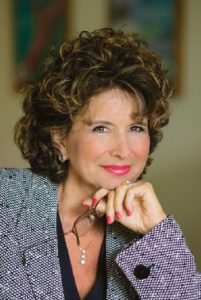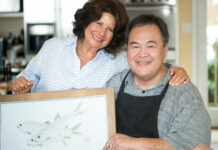Letter from Diane Haynes Woodburn
 A month ago, I had sworn I wouldn’t be traveling, but an invitation to my nephew’s wedding arrived — along with a phone call from my sister in L.A. “We’re getting older,” she reminded me unsympathetically. “We have to go to these events while we still can. . . . besides, it’s in Boston.”
A month ago, I had sworn I wouldn’t be traveling, but an invitation to my nephew’s wedding arrived — along with a phone call from my sister in L.A. “We’re getting older,” she reminded me unsympathetically. “We have to go to these events while we still can. . . . besides, it’s in Boston.”
Boston was my father’s birthplace. The pull was strong to celebrate a new generation who would be making their home in the same city where my great-grandparents had raised their family. It took a few seconds to say yes, and just a few more to extend our adventure to include driving from Boston to Waitsfield, Vermont, where we would visit our friends Peg and Sparky. The wedding was on a Saturday. By Monday, we were “leaf peeping” in Vermont, with Peg as our guide.
“Let’s pull over to the side of the road, so we can clutch our hearts,” Peg was seriously overwhelmed. We had just driven across one of the oldest covered bridges in America. Ahead, the forests and roadside foliage were a kaleidoscope of fall color: fiery orange and copper, sunflower yellow, umber, gold, and the piece de resistance that turned our heads and stopped our hearts — a huge maple adorned entirely in ruby red.
We got out of the car to trek into the forest. Falling leaves danced their way through the trees, sometimes catching a last glint of light before softly landing. “It’s so deeply gorgeous,” Peg sighed. “It makes me feel connected,” my sister added, “not just with nature, but with all of those who came here before us.” How lucky are we, I thought, to be with each other, to have celebrated the continuum of generations with family in Boston, and now here in the beauty of nature to truly celebrate the awe of life.
Silently, I also remembered those who were not so lucky, in particular, a man who I believe shared a similar sense of awe. His name was Kofi Awoonor. Known as one of Africa’s most respected poets, the seventy-eight-year-old was one of the dozens of victims brutally murdered by terrorists at the Westgate Mall in Nairobi. He had been visiting Kenya for a literary festival, where only days before the attack he had been a speaker. Julie Morioki, an aspiring young writer, was there, as reported by National Public Radio. “He literally poured himself out, twenty-four hours before he died,” she recalled. “He told us: ‘When you want to write, look back at how your ancestors used to speak. Go back and listen to the stories of your people and then you will know what to write about.’”
It touched me then to hear a voice so far away, and yet so parallel to the teachings of Hawaiian cultural leaders. “Listen to the ancestors,” our friend Kimokeo Kapahuleha has so often said. “They will show you the path.”
In this issue of Maui No Ka ‘Oi, Rita Goldman brings Kimokeo’s words to life in her story “Now Voyager,” recounting the building of the voyaging canoe Mo‘okiha O Pi‘ilani and its upcoming launching on December 21, 2013, as it begins it life in the ocean, perpetuating Hawaiian culture by honoring the ancestral voices, and bringing the teachings forward, the right way of the path of the ancestors.
Today, in the Vermont forest, standing with my sister, I am reminded that the voices of our ancestors are all around us; beneath our feet, above our heads, within our hearts. In the words of Kimokeo, “It is up to us to listen, to hear, to act upon what is right, what is pono.”
I wondered, what would my ancestors want me to write about? I believe they would tell me to write about freedom, human rights and the Golden Rule, “Do unto others as you would have them do unto you.” They would want me to ask you to take care of each other, to stand strong against inhumanity, to embrace tolerance.
This holiday season, and every season, may your life be filled with love, peace, and goodwill toward all. And may your days be filled with awe.
Mele Kalikimaka




